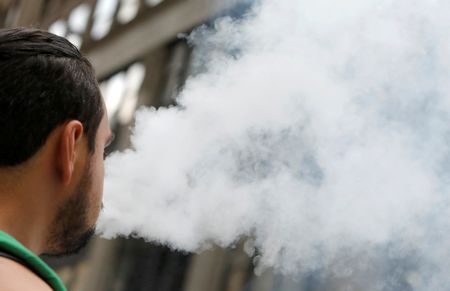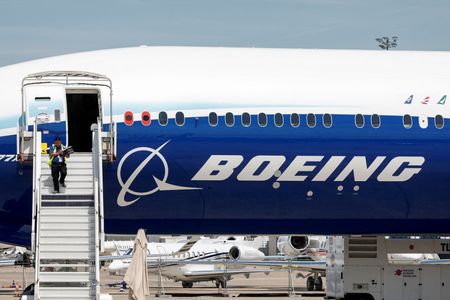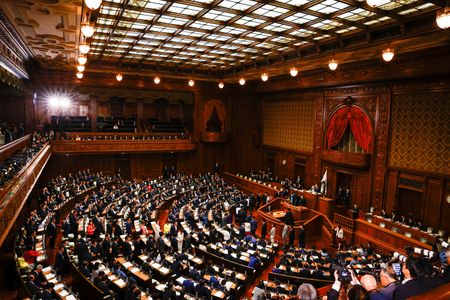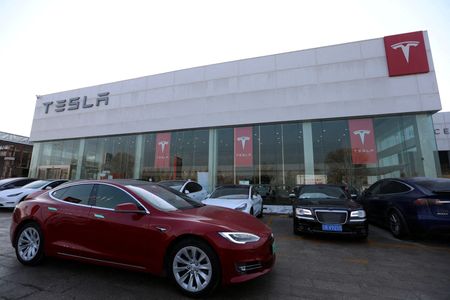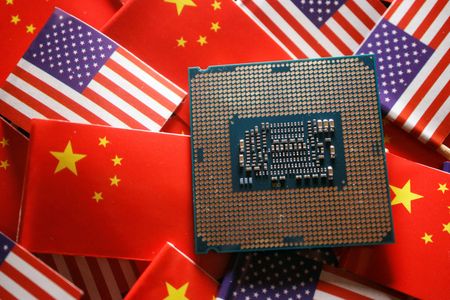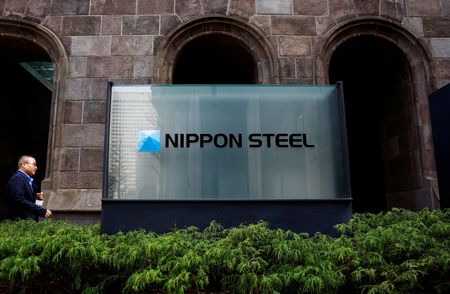By Stella Qiu
SYDNEY (Reuters) – Asian shares slid on Tuesday amid concerns about U.S. investment curbs on China, while a run-up in the euro faded as investors wait for Germany to sort out the formation of its new government.
Investors are also cautious ahead of results from artificial intelligence darling Nvidia on Wednesday, where options point to a share price move of about 8% in either direction should they surprise.
Europe is set to open flat, with pan-European STOXX 50 futures little changed. Nasdaq futures and S&P 500 futures were up 0.1% in Asia.
In Asia, MSCI’s broadest index of Asia-Pacific shares outside Japan dropped 1%. Japan’s Nikkei returned from a public holiday with a 1.3% fall, but shares of its five major trading houses surged thanks to interest from billionaire investor Warren Buffett.
Bank of Korea on Tuesday cut its interest rates by a quarter-point as expected, helping South Korean shares to trim some losses.
Hong Kong’s Hang Seng index initially fell as much as 2.7%, but it was last down 1%. Chinese blue chips dropped 0.8%.
Shares in tech giant Alibaba, which had propelled the Hong Kong index to three-year highs, were last down 3.2% after its U.S.-listed shares tumbled 10% overnight in the biggest daily drop in more than two years.
Investors were rattled by an order from U.S. President Donald Trump to restrict Chinese investments in strategic areas such as chips, AI and aerospace. Bloomberg reported Washington is seeking to toughen restrictions on the export of semiconductor technology to China, with the help of allies.
“The optimism about China’s tech sector cools off as markets realise that the more positive the outlook for the sector, the greater the risk it will be targeted by the US,” said Kyle Rodda, a senior analyst at Capital.com.
Also weighing on sentiment was Trump’s indication that proposed tariffs on Mexico and Canada were still set to start next week, although investors had hoped negotiations would forestall the threat.
Overnight on Wall Street, technology shares tumbled. The broad pullback in stocks has raised the stakes for Nvidia’s results, when investors will be looking for further rapid growth in revenue and questioning whether the hefty spending on the technology is justified after China’s low-cost DeepSeek rattled the industry.
A slew of weak U.S. data over recent days – including retail sales, consumer confidence and surveys on the manufacturing and services sectors – have eroded market confidence about the exceptionalism of the U.S. economy, taking some shine out of the U.S. dollar.
Combined with Trump’s incoming tariffs and the uncertainty over a barrage of federal government layoffs, investors see the Federal Reserve on track to cut rates by a total of 50 basis points this year, up from 40 bps just last week.
Bonds have rallied, with benchmark 10-year Treasury yields hitting a new two-month low of 4.371% in Asia. Two-year yields also touched 4.143%, the lowest since early December.[US/]
In currency markets, the run-up in the euro faded out, with the currency back to where it started the week. It was last at $1.0476, having hit a one-month top of $1.0528 after Germany’s election produced no nasty surprises.
The U.S. dollar bounced from its 2-1/2-month low against its major peers and was last at 106.59.
Friedrich Merz is set to become Germany’s next chancellor after his opposition conservatives won the national election. Merz should be able to form a coalition to govern with the ruling centre-left Social Democrats, even though the party finished third behind the far-right Alternative for Germany.
Oil prices were slightly higher on Tuesday on fresh U.S. sanctions imposed on Iran. Brent crude rose 0.5% at $75.13 a barrel, while U.S. crude was up 0.6% at $71.14 a barrel.
Gold ran into some profit-taking and was last down 0.5% at $2,937 per ounce, having hit a record high of $2,956.15 on Monday.
(Reporting by Stella Qiu; Editing by Gerry Doyle and Jamie Freed)



